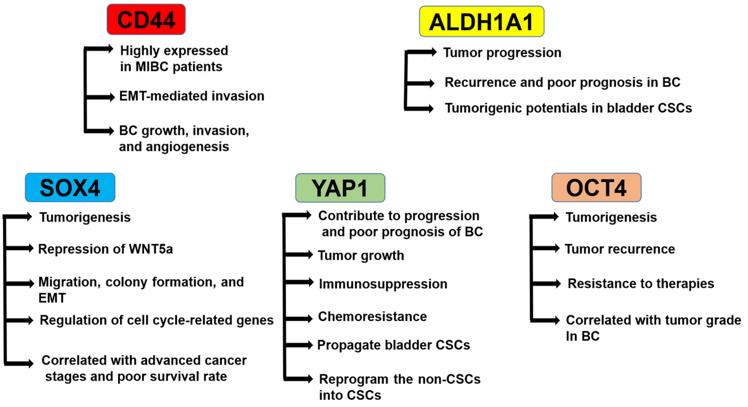Bladder Cancer Stem Cell Markers
Related Symbol Search List
Immunology Background
Overview of Bladder Cancer Stem Cell Markers
The study of bladder cancer stem cell markers is a critical research field aiming to enhance our comprehension and detection of stem cells within bladder cancer. Stem cells are characterized by self-renewal and multiple potentials, which makes it particularly crucial to study them in depth in bladder cancer treatment and prevention research. Researchers have used different methods to identify bladder cancer stem cell markers. One of them is by analyzing the phenotypic differences between stem cells and non-stem cells, for example by using specific cell surface markers for identification. Another approach is by inducing stem cell differentiation and then observing changes in their morphology, function, and gene expression profiles to determine their stem cell properties.
Many markers have been identified for the identification and isolation of bladder cancer stem cells, such as CD44, CD67LR, EMA, CD133, SOX2, SOX4, ALDH1A1, EZH1, BMI1, MAGE-A3, PD-L1, YAP1, and COX2/PGE2/STAT3, as well as the molecules related to hedgehog, phosphoinositide 3-kinase (PI3K)/AKT, Wnt/β-catenin, Notch, and c-Myc signaling pathways (as shown in Figure 1). The discovery of these markers has provided researchers with additional opportunities to study and understand stem cells in bladder cancer and to gain insight into therapeutic and preventive approaches to the disease.
 Fig.1 Roles of cancer stem cell markers in bladder cancer. (Abugomaa, A, et al., 2020)
Fig.1 Roles of cancer stem cell markers in bladder cancer. (Abugomaa, A, et al., 2020)
Research Areas of Bladder Cancer Stem Cell Markers
- Identification of new bladder cancer stem cell markers
Currently, there are a limited number of known markers for bladder cancer stem cells, and there is a need to identify and validate new bladder cancer stem cell markers to fully characterize these cell populations.
- Molecular mechanisms
Researchers can explore the relationship between bladder cancer stem cell markers and cancer development, metastasis, and drug resistance. A deeper understanding of the function of these markers in stem cell self-renewal, proliferation, and differentiation could provide a rationale for the development of new therapeutic strategies.
- Therapeutic strategy development
In combination with bladder cancer stem cell markers, the development of targeted therapeutic strategies against these cells can be investigated. For example, antibody therapy against the markers, stem cell-induced elimination, or redirection of stem cell differentiation are expected to improve the outcome of bladder cancer treatment.
- Clinical applications
Further research into the potential clinical applications of bladder cancer stem cell markers could help improve the early diagnosis of bladder cancer, assess prognosis, and monitor disease progression. The detection of markers can also be used to assess drug efficacy and guide the development of individualized treatment plans.
- Stem cells and tumor immunotherapy
Researchers can delve into the role of bladder cancer stem cells and their markers in tumor immunotherapy. Understanding the impact of stem cells on tumor immune escape, immune surveillance, and immunotherapy resistance could help improve and develop more effective tumor immunotherapies.
In conclusion, expanding the field of research on bladder cancer stem cell markers can provide new opportunities and challenges in basic science, clinical medicine, and therapeutic strategy development, which is expected to have a positive impact on the treatment and management of bladder cancer.
Bladder cancer stem cell markers are an exciting and promising area of research. An in-depth study of these markers is expected to provide new strategies and approaches for preventing and treating bladder cancer, improving patients' quality of life, and reducing cancer mortality. As research progresses, we can expect more groundbreaking discoveries about bladder cancer stem cell markers.
Reference:
- Abugomaa, A.; Elbadawy, M.; Yamawaki, H.; Usui, T.; Sasaki, K. Emerging Roles of Cancer Stem Cells in Bladder Cancer Progression, Tumorigenesis, and Resistance to Chemotherapy: A Potential Therapeutic Target for Bladder Cancer. Cells 2020, 9, 235. https://doi.org/10.3390/cells9010235.

